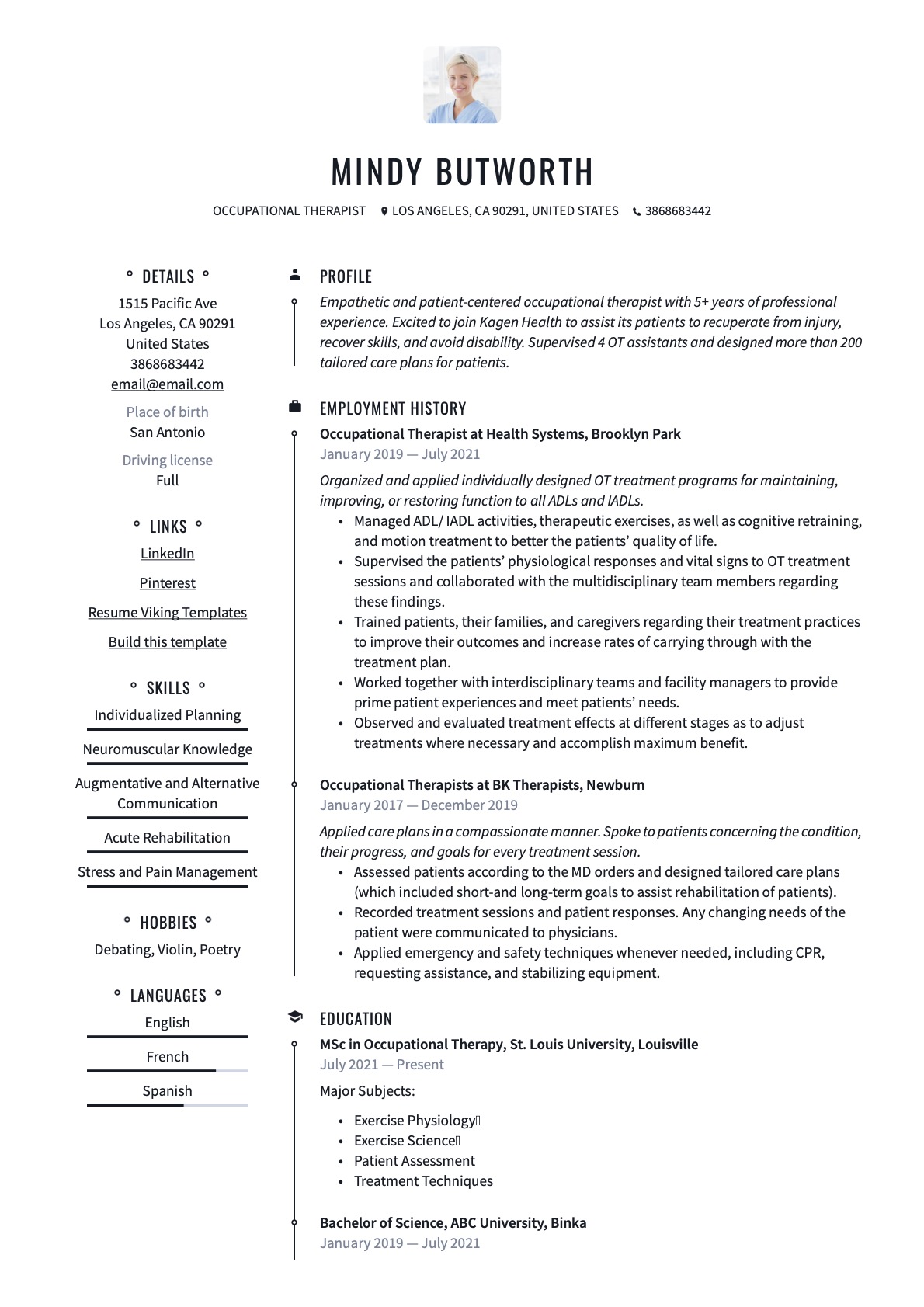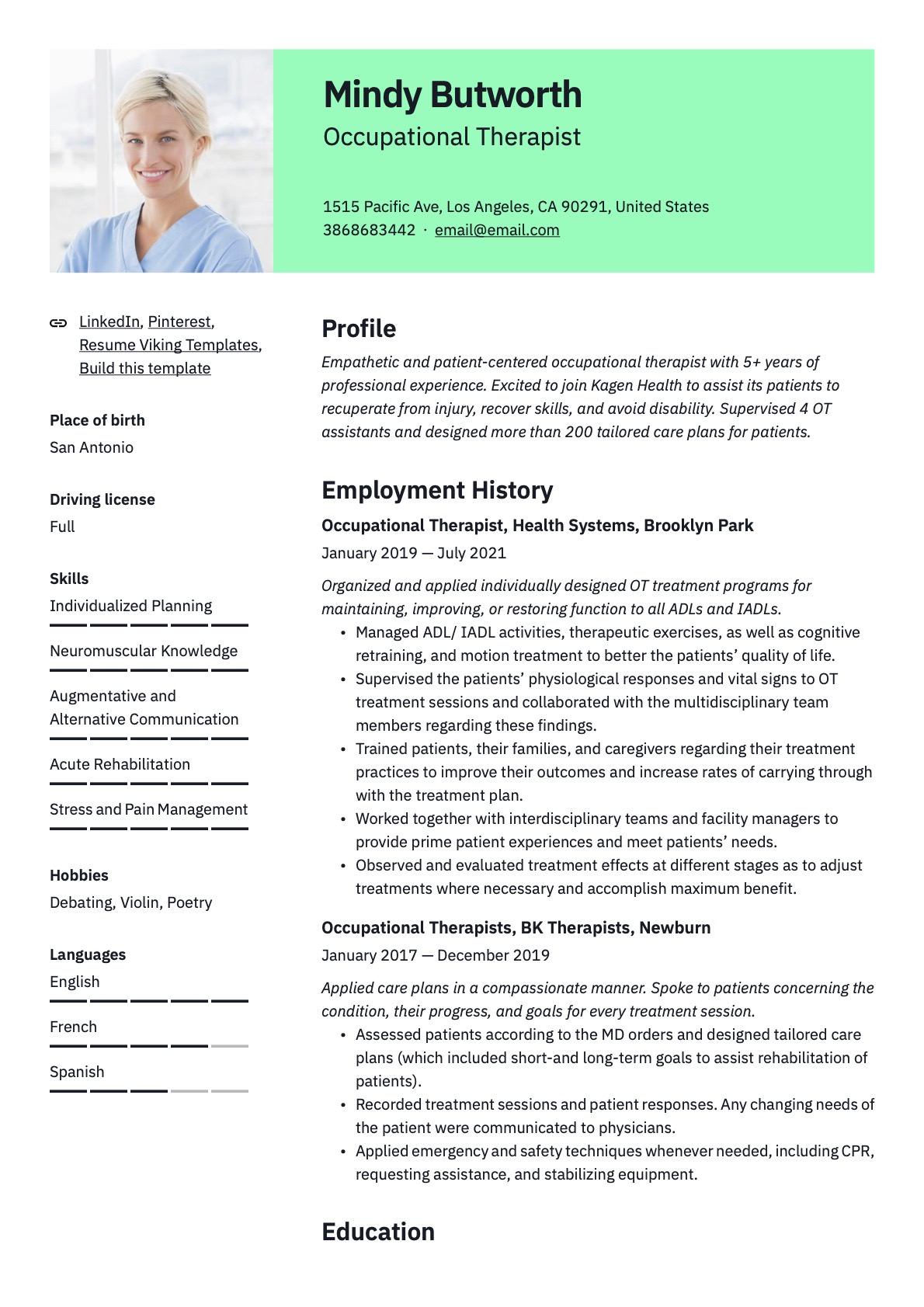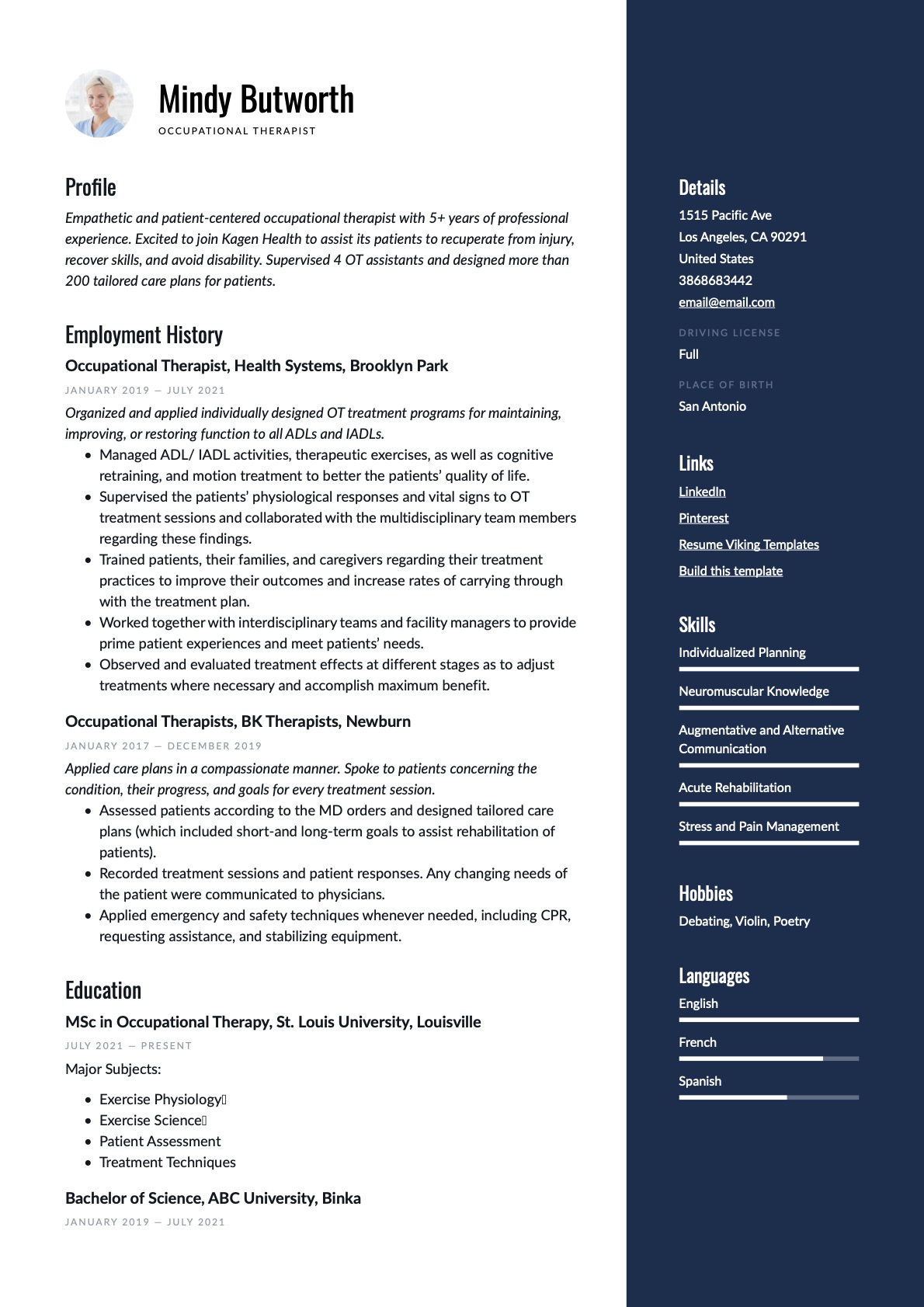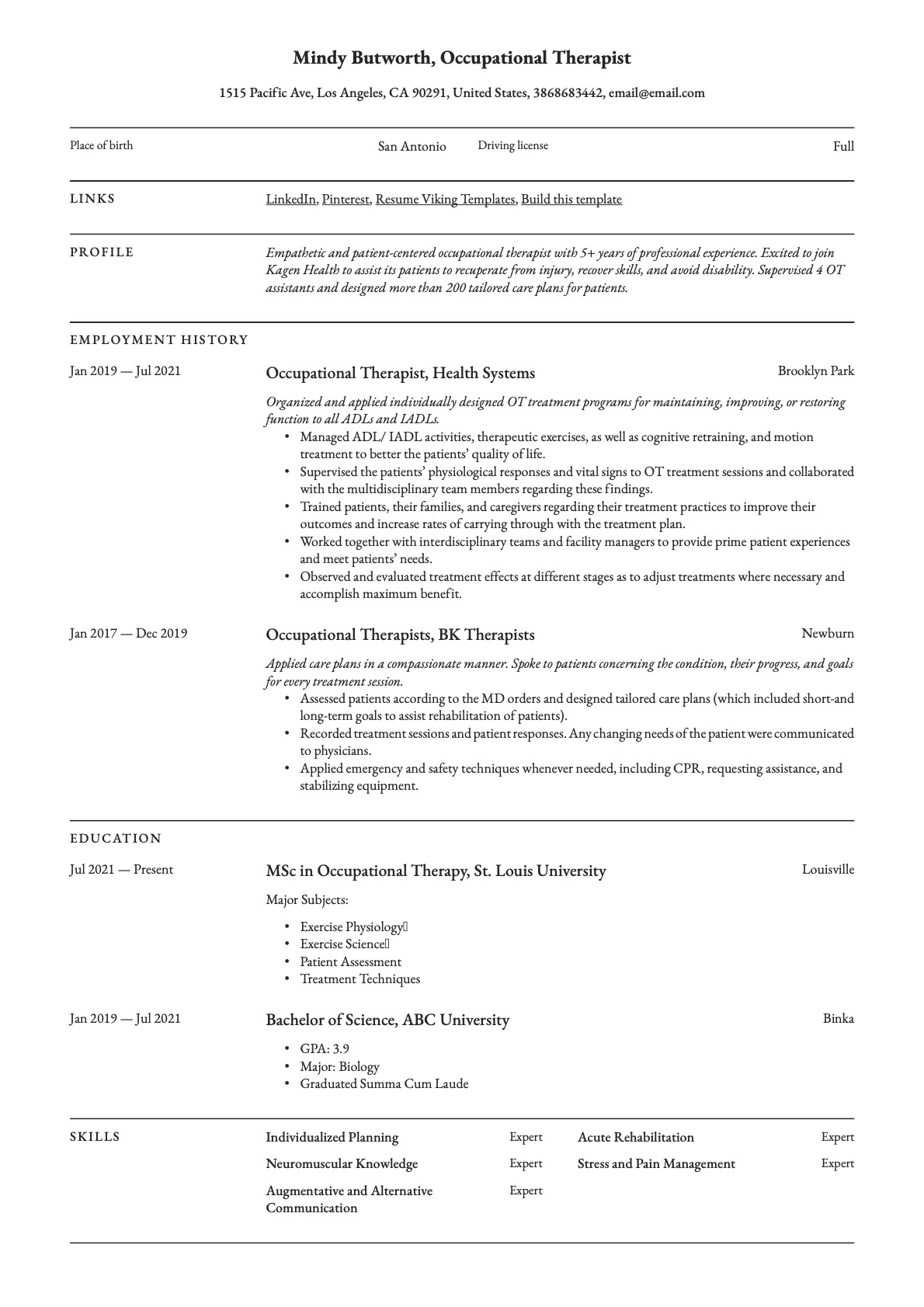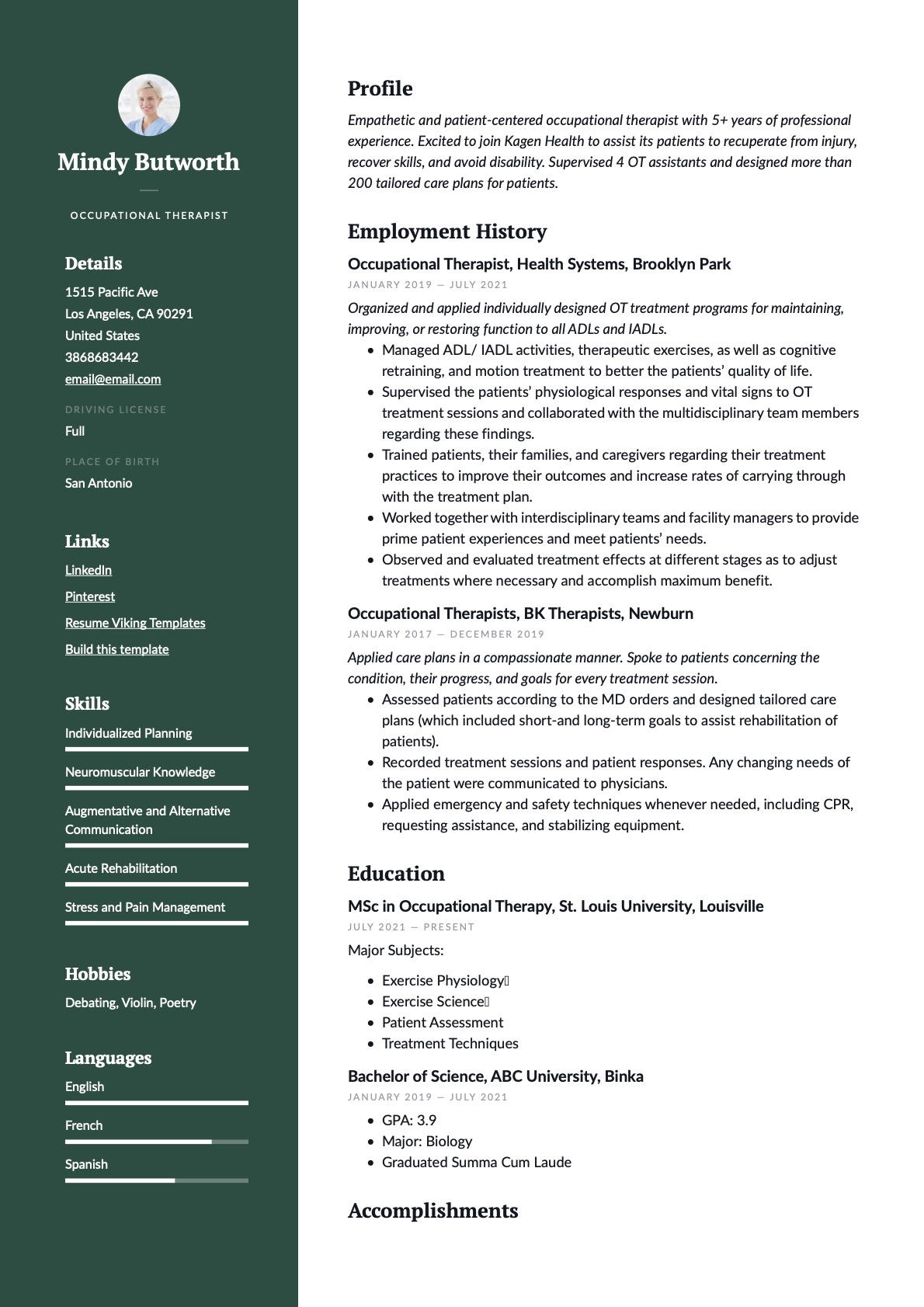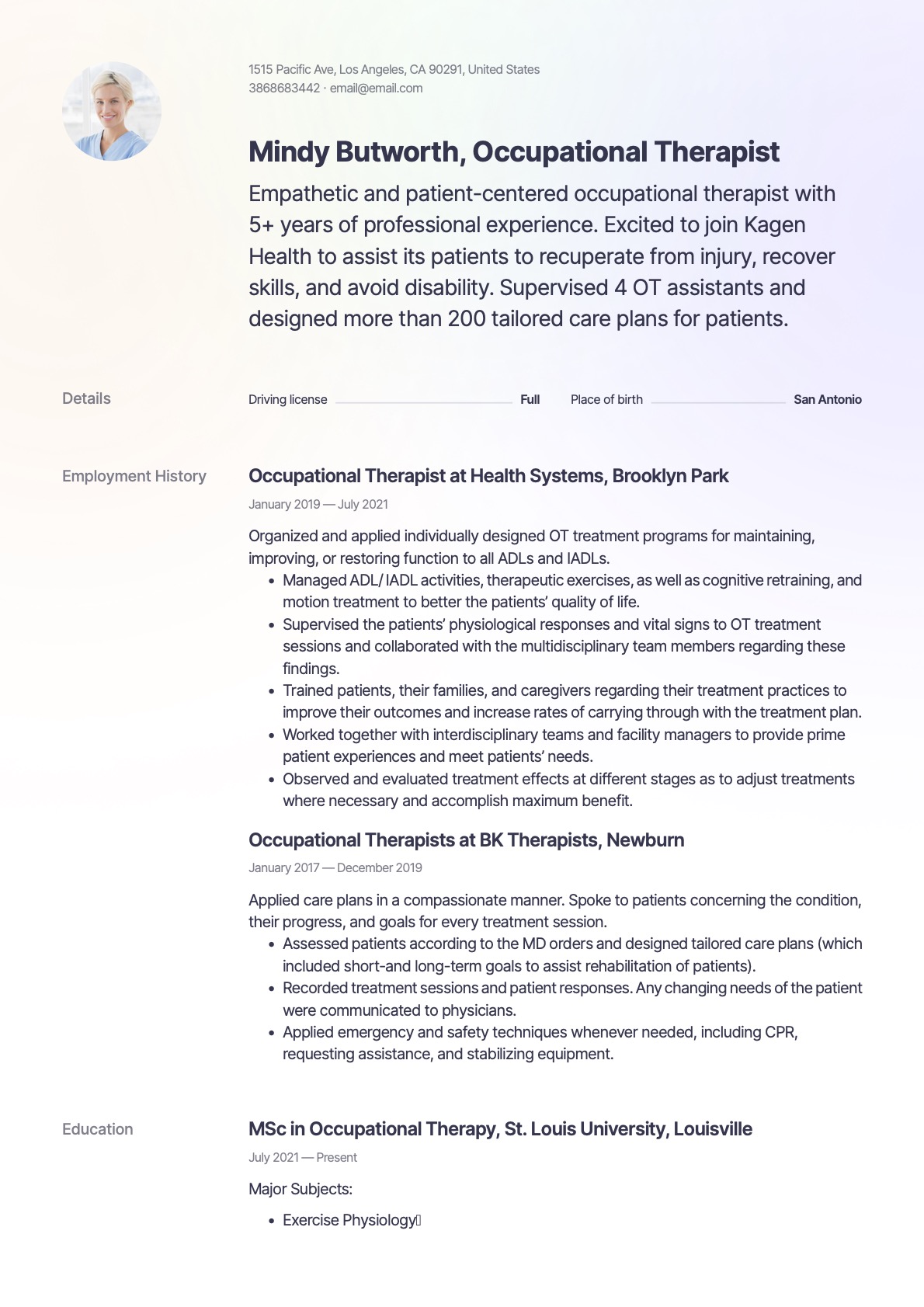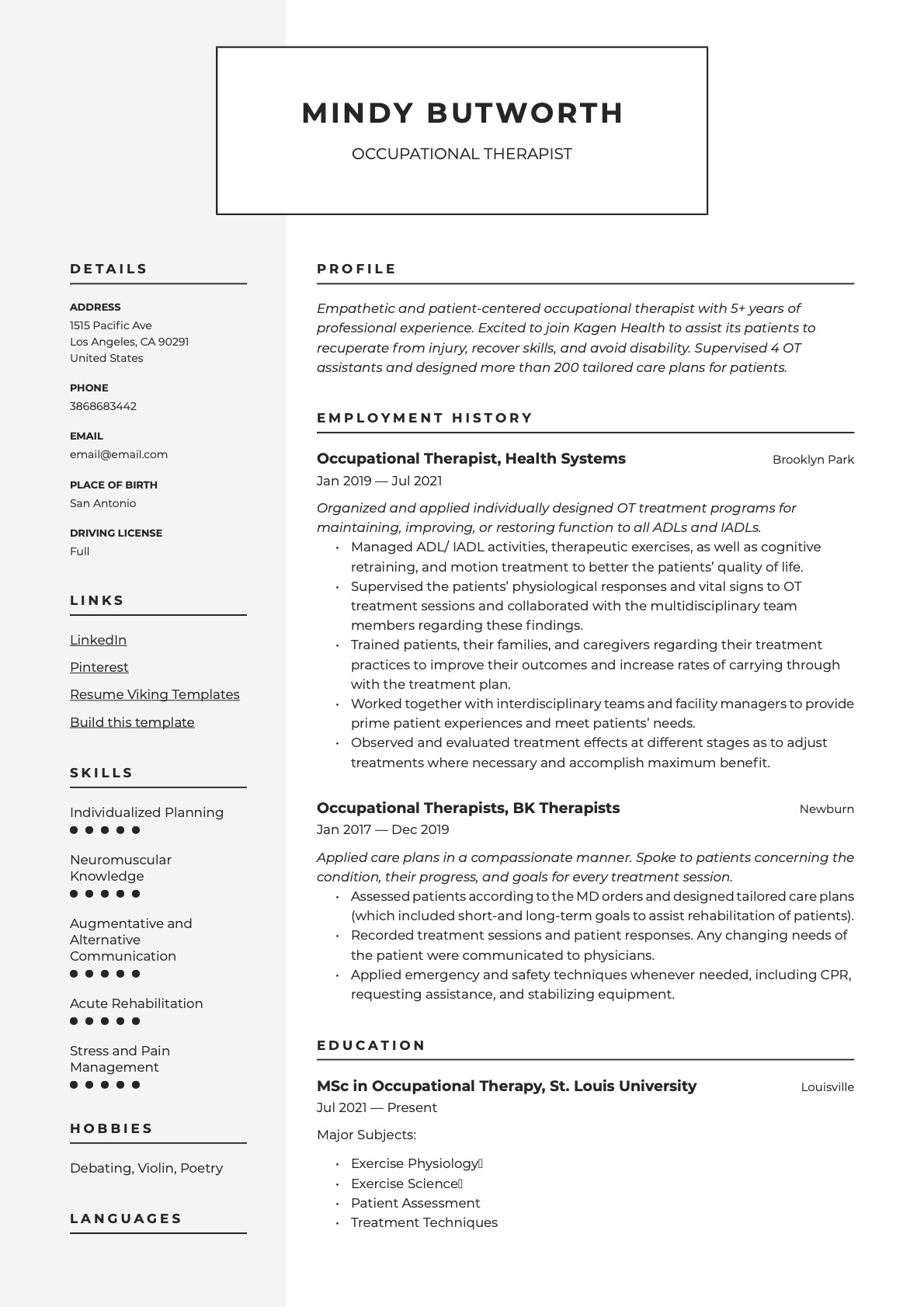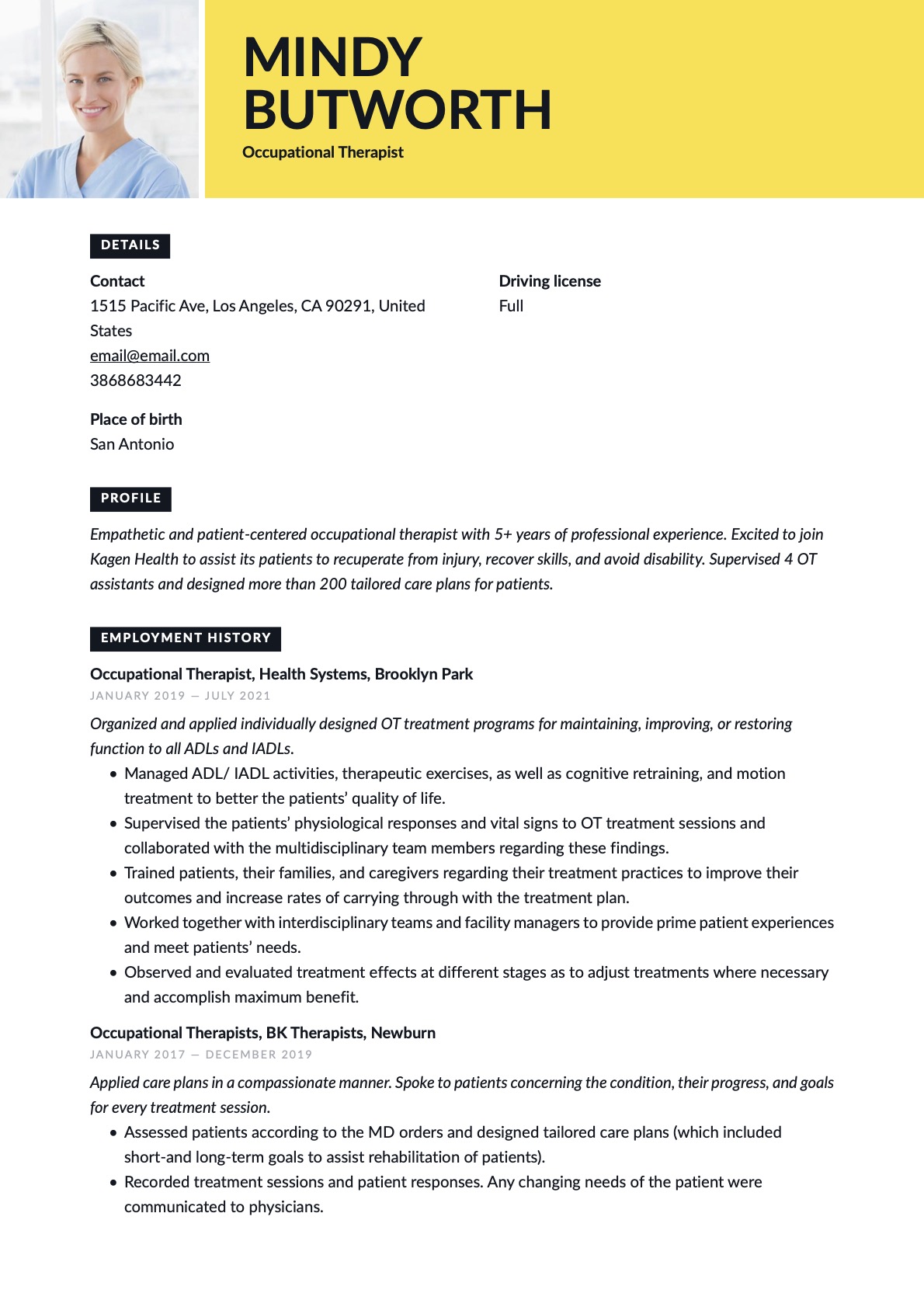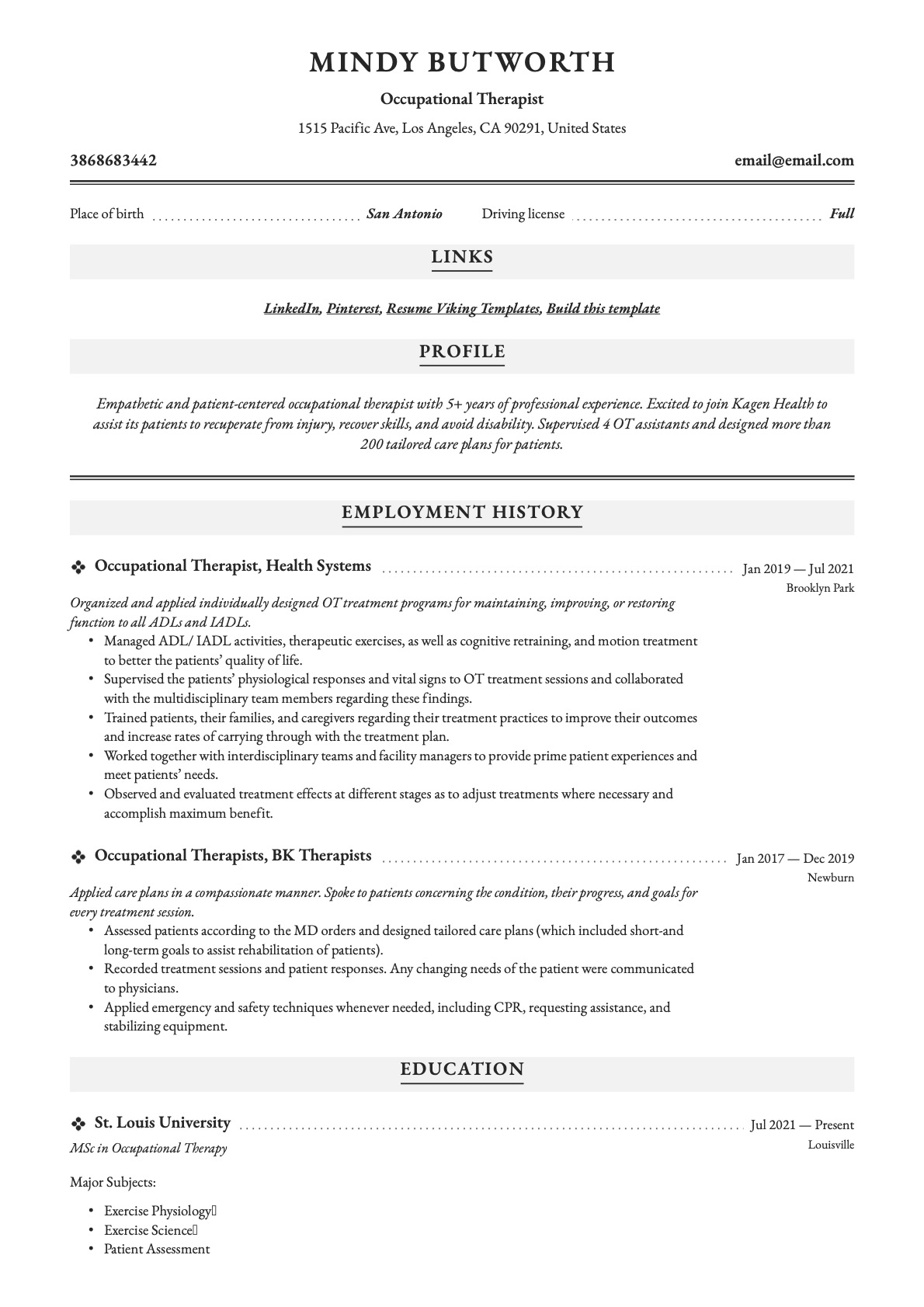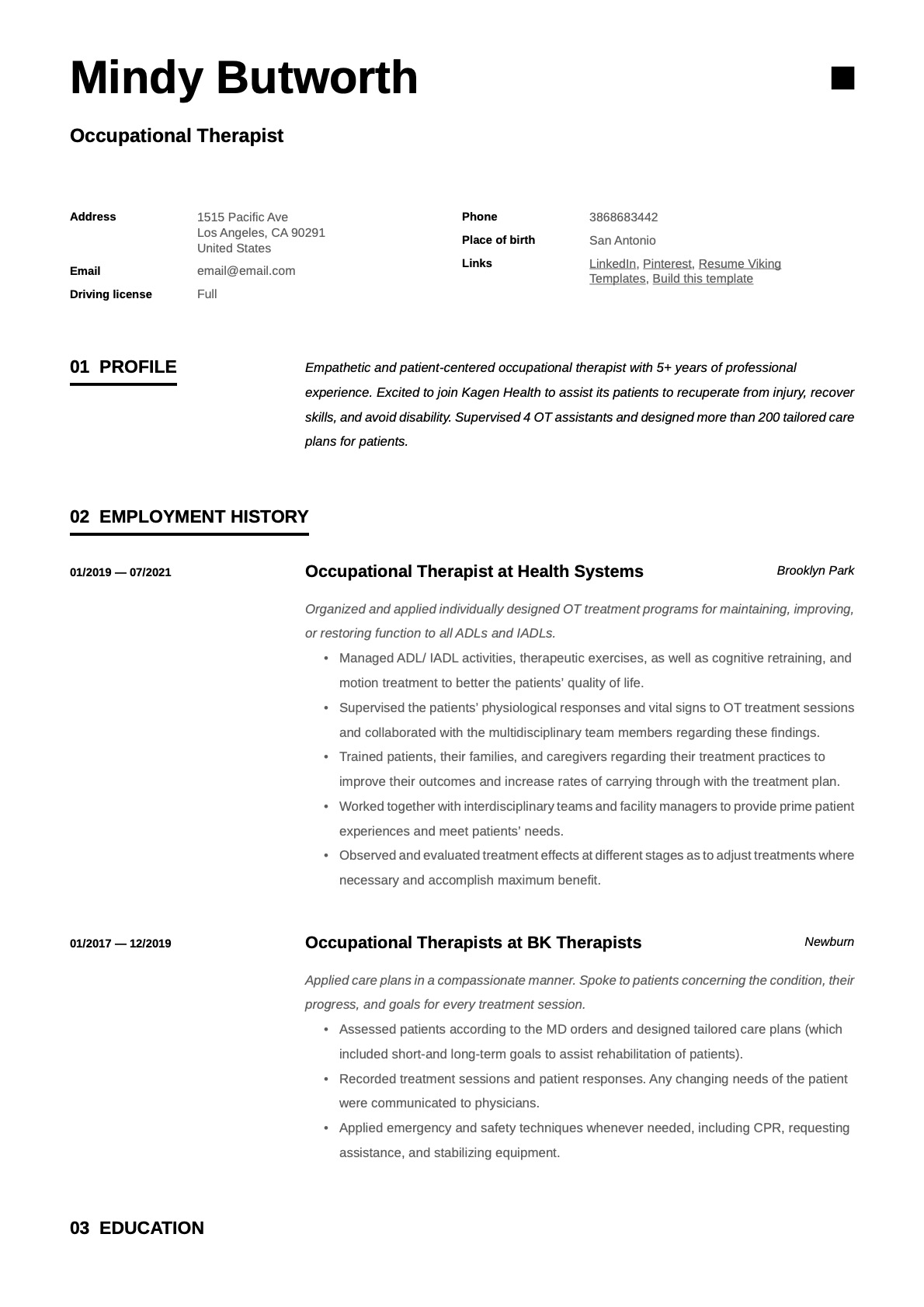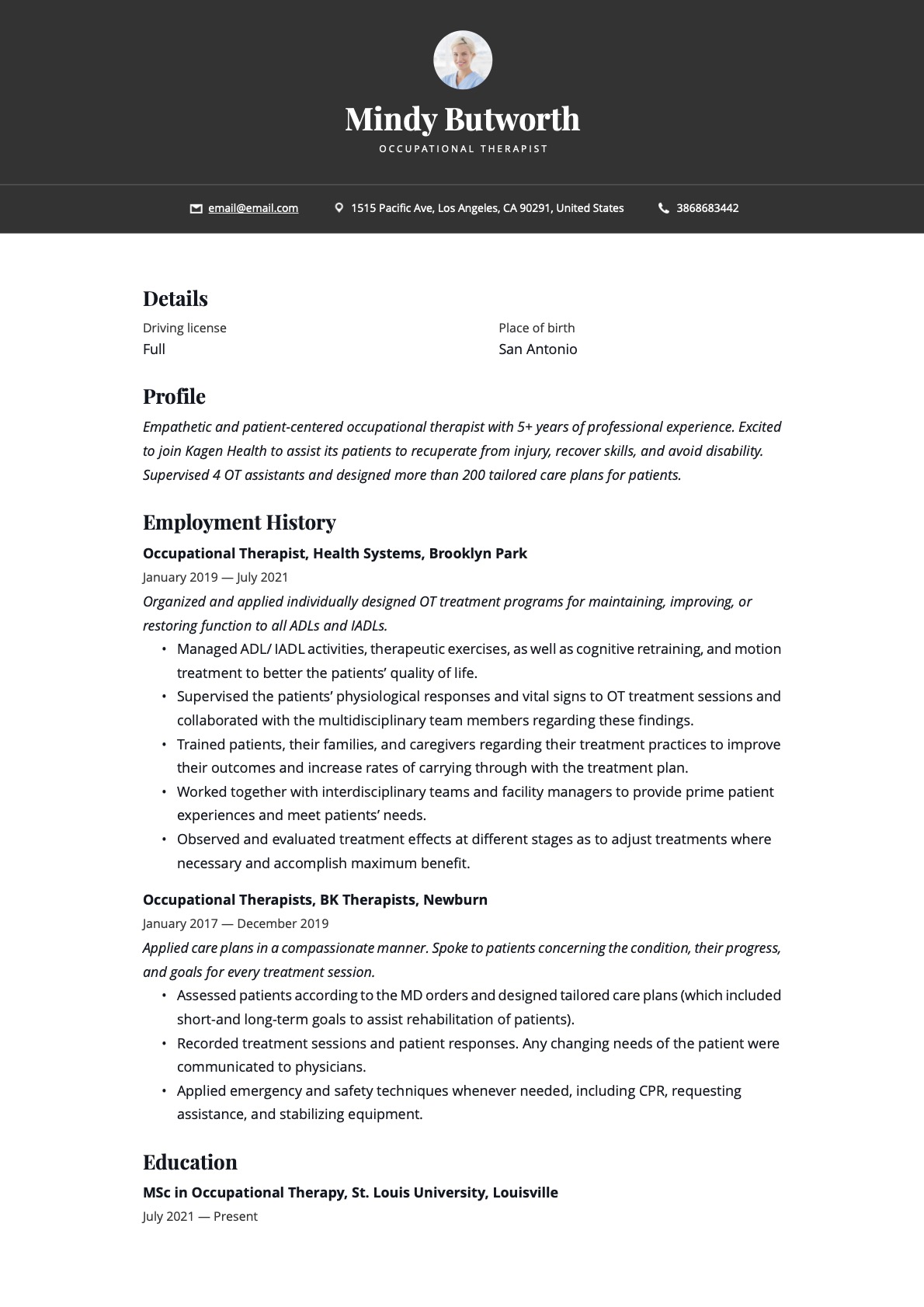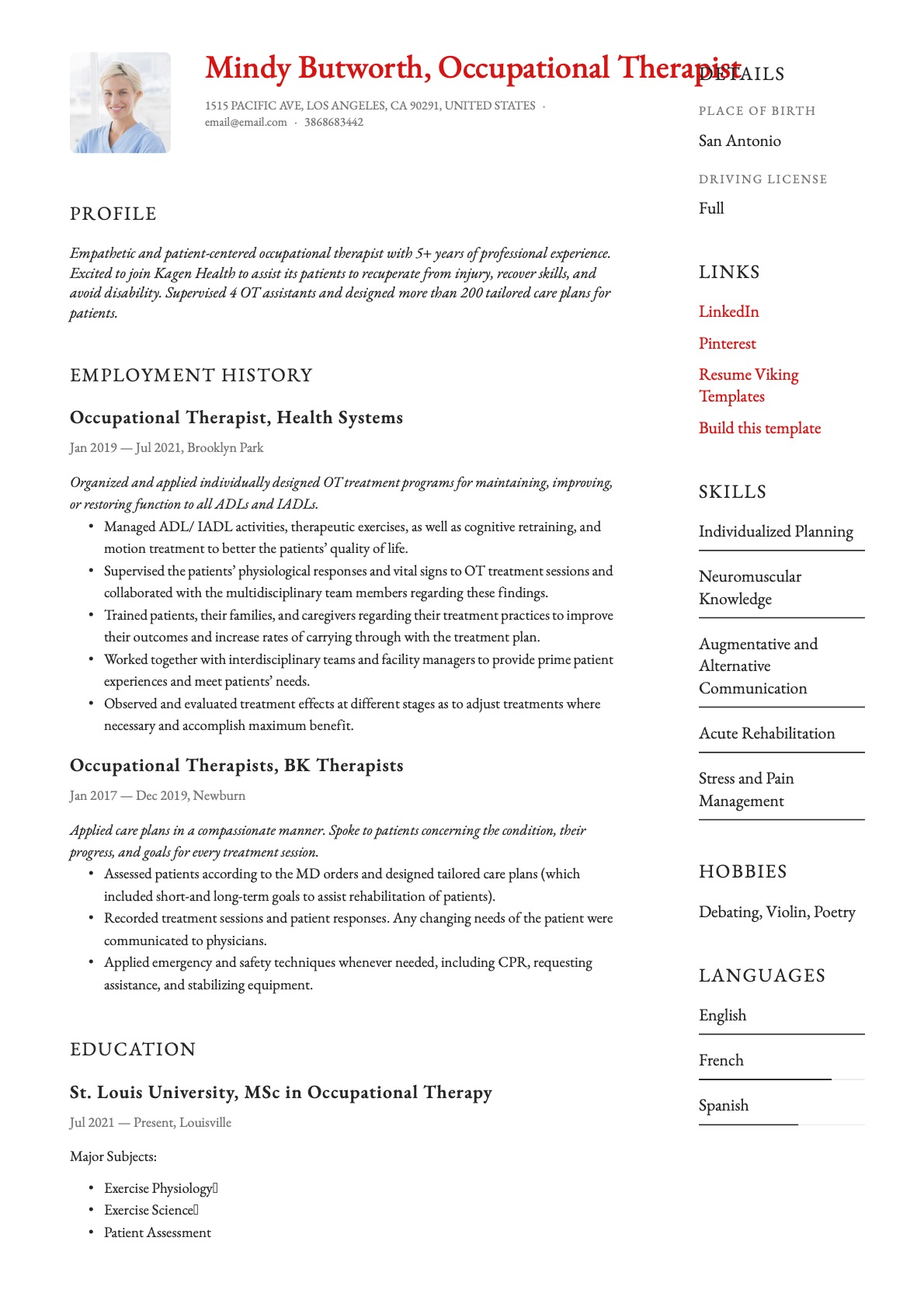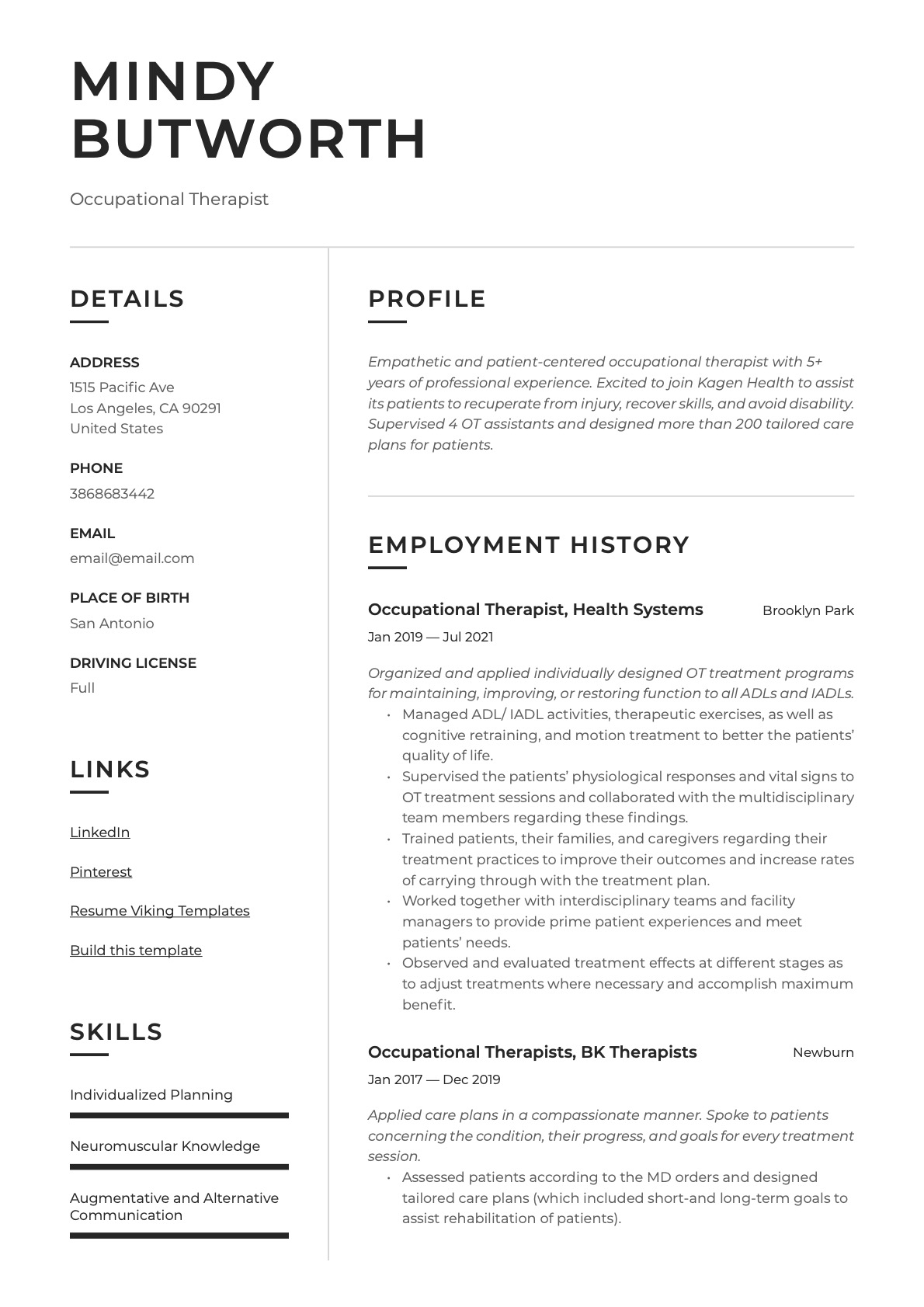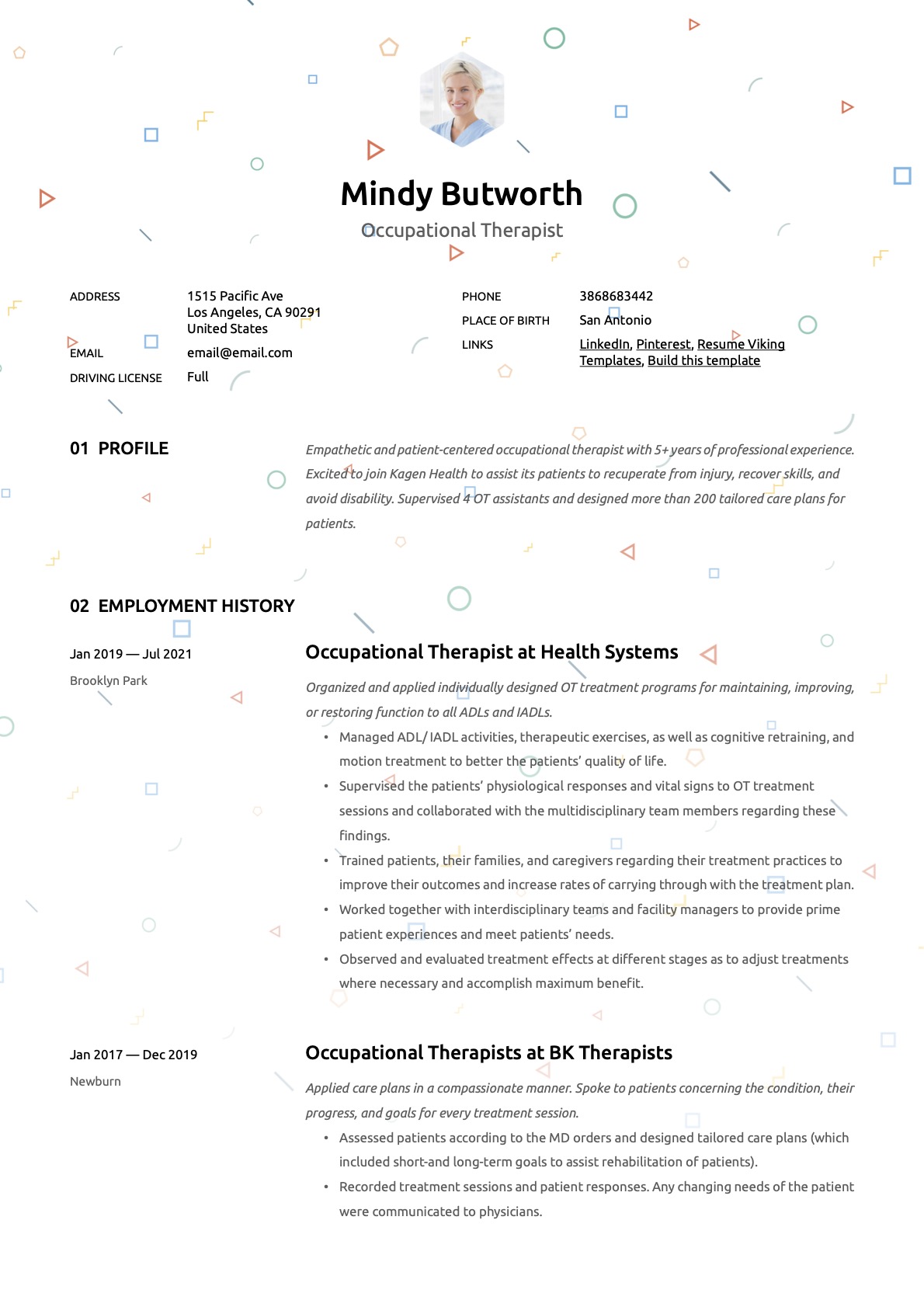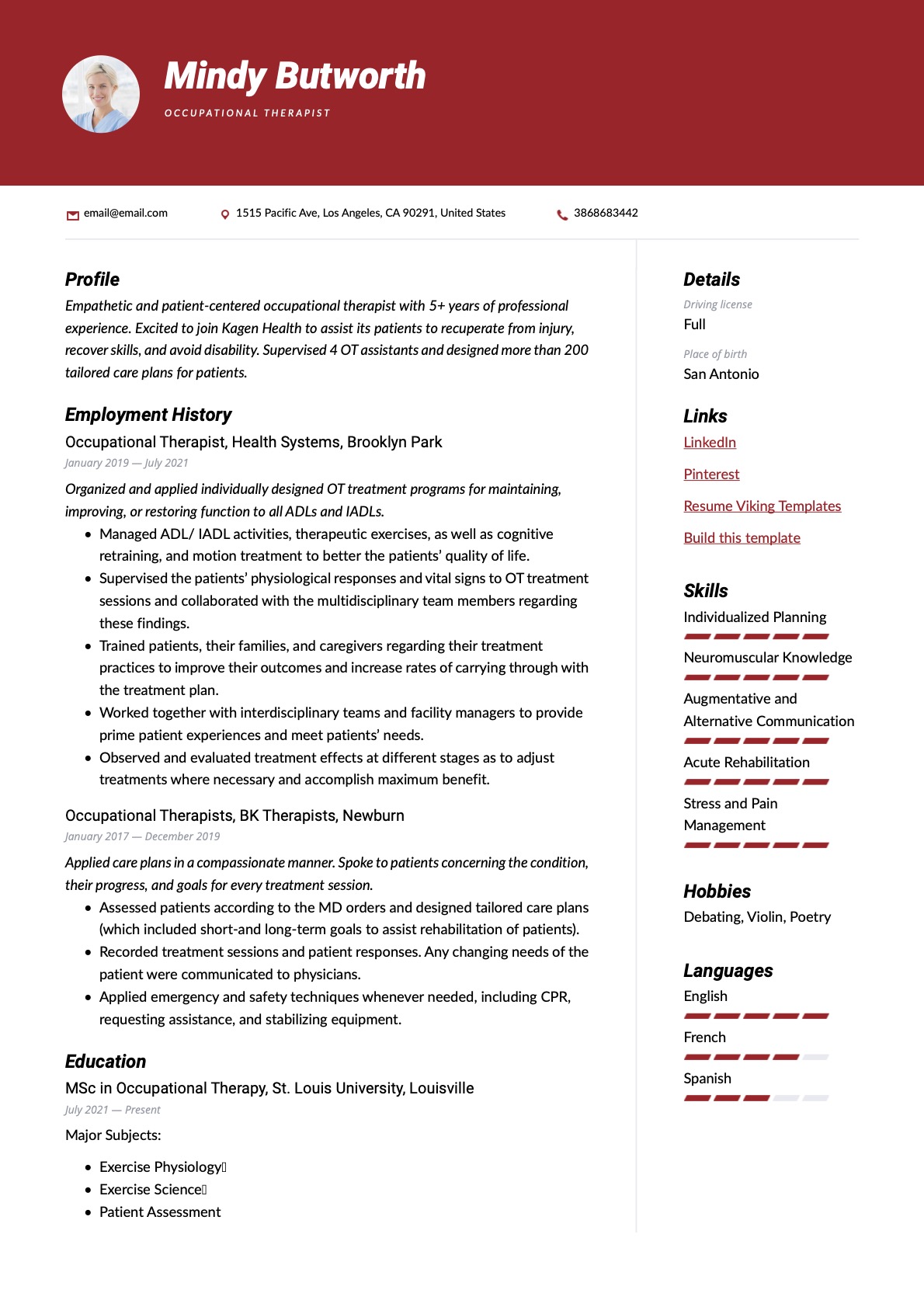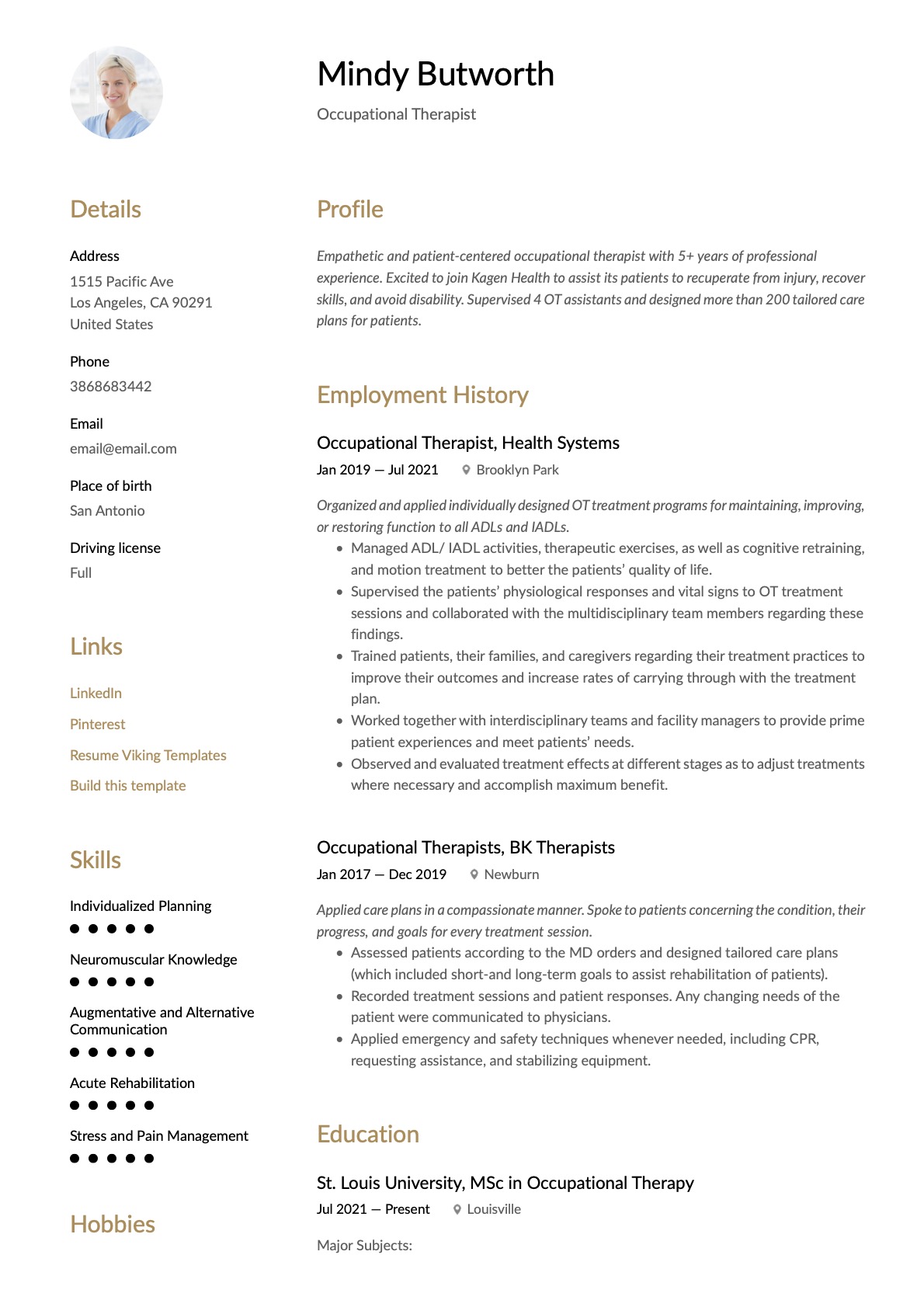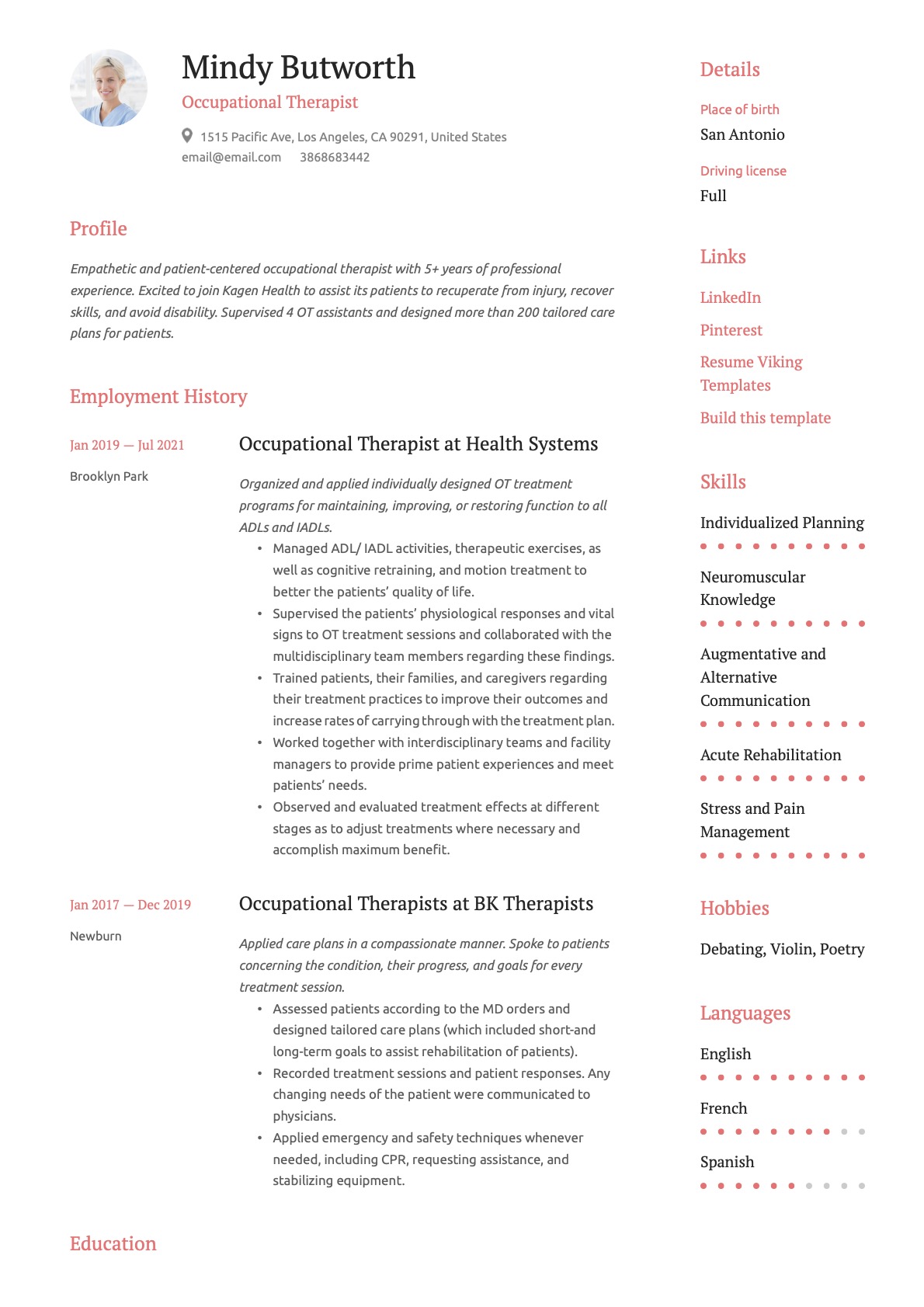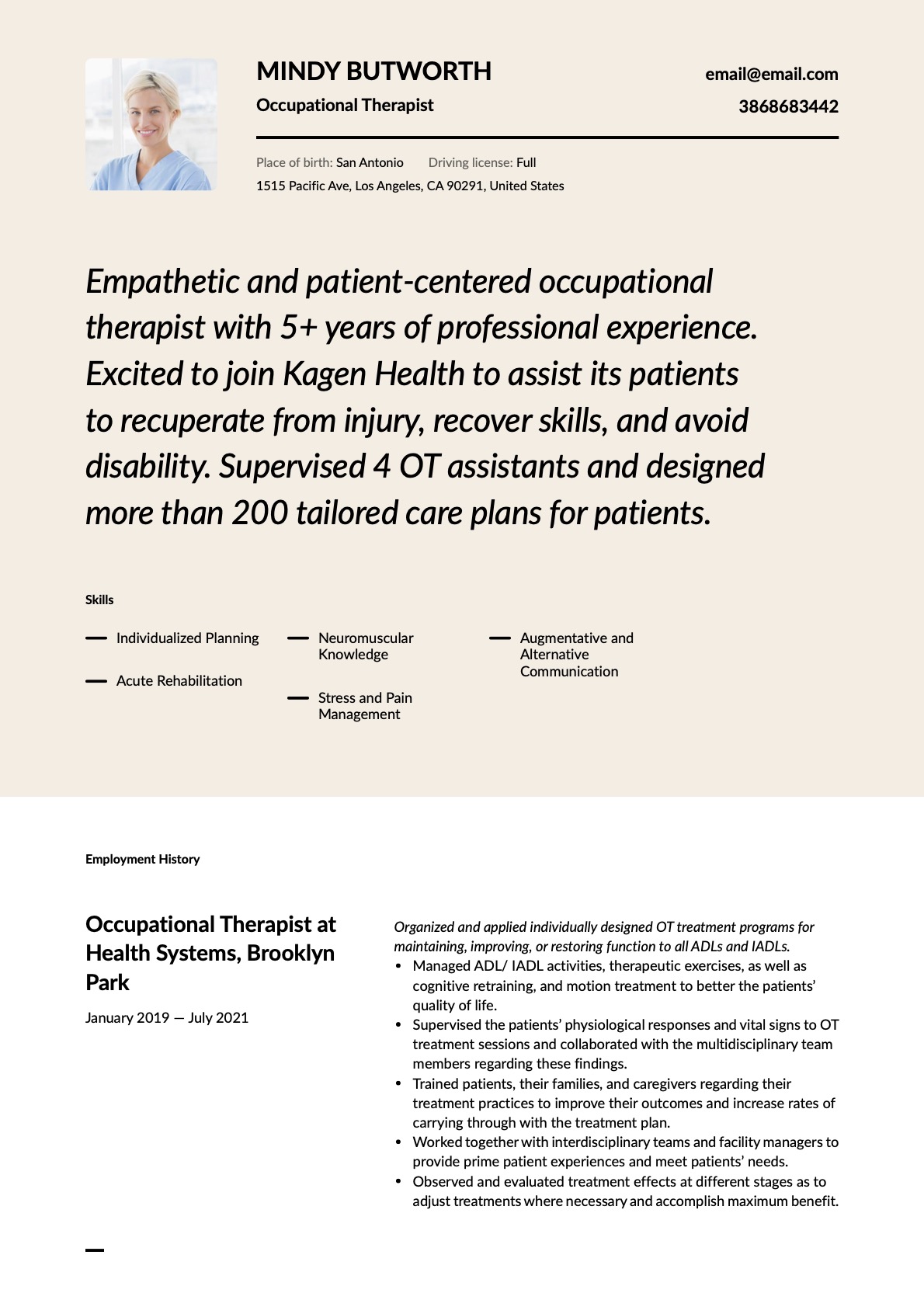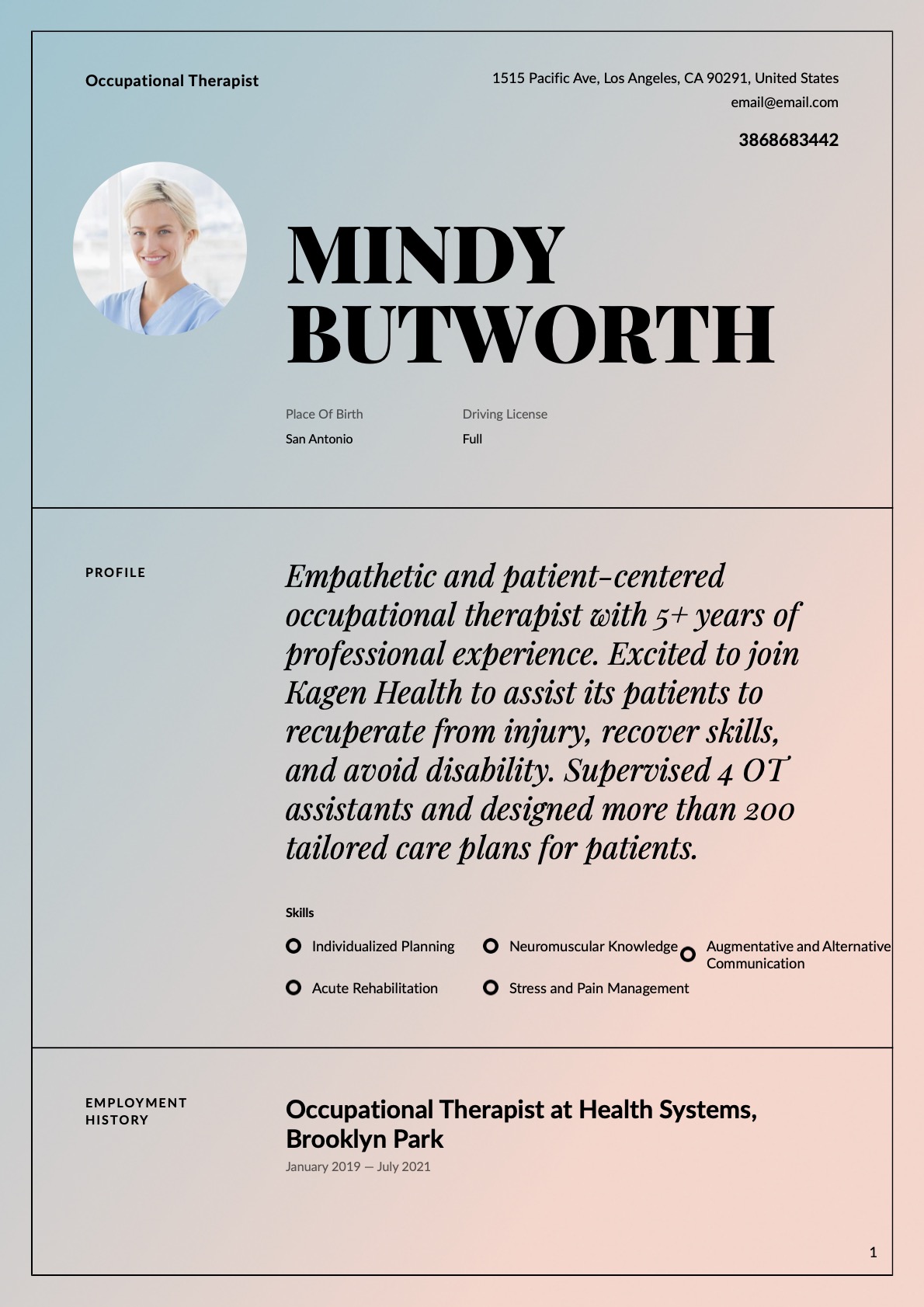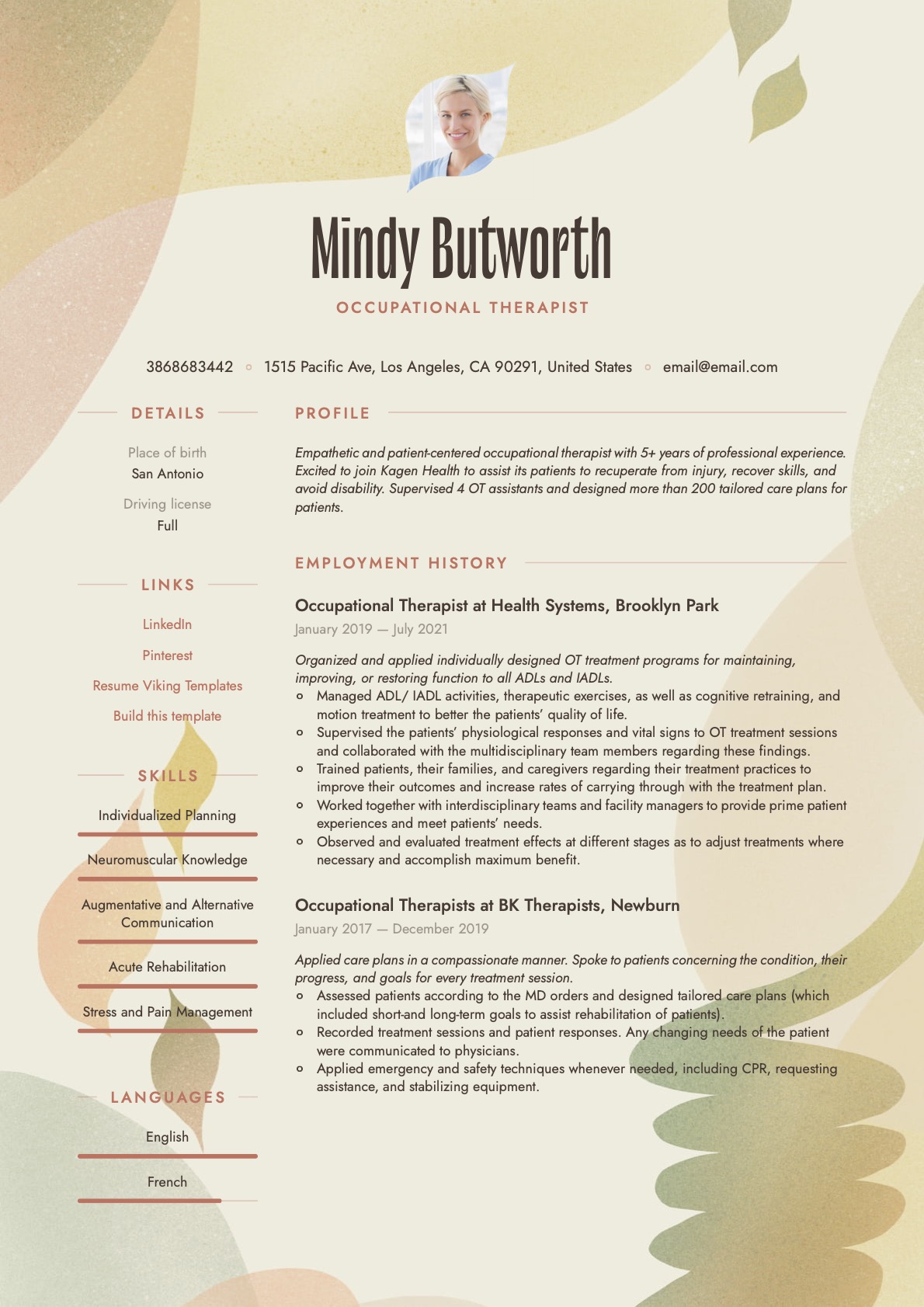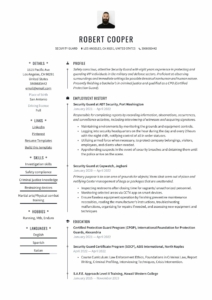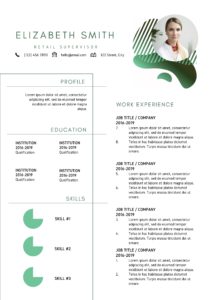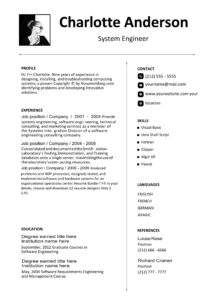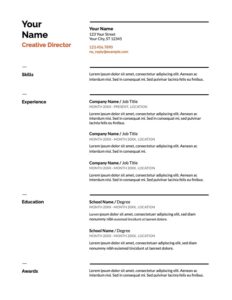Welcome to our guidelines for creating the ultimate OT resume! Whether you’re new to this or a veteran, we have all the info, examples, and tips you’ll need to create your best interview-winning resume.
Of course, you know from being an OT requires so much more than techniques and achievements, so design your resume to show that you’re more than just an OT.
Let us dive into this guideline on how to create a Resume for Occupational Therapist jobs and get started!
What you can read in this article
21 Occupational Therapist Resume Examples
(Free resume sample downloads are at the bottom of this page (pdf)
Occupational Therapist Resume Writing Guide
Resume Sections
- Contact information
- Profile Summary
- Work History
- Achievements
- Education
- Skill Section
- Certification & Licensing
- Extras: Languages/Awards/Publications/Volunteering/hobbies
- > Professional information
1. Contact information
- First Name and Last Name
- Physical Address
- Telephone number
- LinkedIn Profile
What to Highlight in an Occupational Therapist Resume
This is quite a competitive industry, and getting your foot in the door can be difficult. It’s super important to highlight your incredible soft skills and technical skillset. Your education and licensing info much be in a visible section of the resume.
Utilize your work history to showcase your skills and how they benefitted your previous employer. At the beginning of your resume, have a career summary/ objective statement that briefly mentions all your best attributes (more on this in the next section).
It is vital to elaborate on your specialties such as neuromuscular, musculoskeletal, polytrauma, hand specialist, home-based primary care, post-acute rehabilitation, geriatrics, pediatrics, etc.
In this advanced technological age, you must mention all equipment you can use! This includes, but isn’t limited to, orthotics and adaptive/assistive equipment; blind/ visual rehabilitation assistive technology; low tech and high-tech access options; Augmentative and Alternative Communication (AAC); other access tools (i.e., joysticks, switches, specialty interfaces, keyguards).
Extras such as other experience/ skills like CPR or First Aid training, Basic Life Support (BLS) certifications, different languages you can speak, etc., are a great way to catch the recruiter's attention.
We advise you to keep your LinkedIn account updated. If used in the right way, LinkedIn is a great tool during your job search. Include your URL in the info.
If you’re changing careers from something else into OT, don’t even stress if your OT working experience is low to nothing. Just focus on the transferable skills you attained from the last job you worked. You can also include extracurricular activities and volunteer work to help beef up your resume.
Avoid all spelling and grammar mistakes! It’s a professional document, and recruiters can’t be expected to assume you can do your job better than anyone else if you can’t even spell properly.
Lastly, these tips are invaluable when writing your resume:
- Choose the correct format. Reverse-chronological order is used nine times out of 10. It puts all relevant info first, and it’s easy to read.
- Use simple, professional, and clear fonts. While the fancy ones look nice, they aren’t great to read and don’t look good.
- It’s not an autobiography. Stay concise and gives only the important and applicable info.
- Unless the job advert specifically states not to save your resume as a PDF, definitely save it as a PDF.
Resume Summary & Objective
This section shouldn’t take more than 20–30 seconds to read.
A career summary/ objective is one of the first things a recruiter sees, and this section must be perfect. It allows the recruiters to glimpse what your entire resume will be like in just 4-6 sentences. A kick-ass summary/ objective may be the difference between a recruiter taking the time to read your resume more thoroughly or tossing it on the “no” pile.
Many companies use applicant tracking systems (ATS) to help them sort relevant resumes out from those that don’t cut. How do they decide this? By scanning for keywords used in the job advert. So, make sure you read the ad and use the same words they use in your resume. If you don’t do this, your resume won’t make it to the recruiter’s desk.
You have two options:
If you have more than three years of working experience, a summary is a good choice for you. It highlights your experience, skillset, achievements, and education.
If you have little/ no experience, an objective is a better choice. It focuses on your skills and career ambitions. You must highlight how you plan to bring value to the company.
One other thing. You must add quantification to elaborate on your skills and experience.
Example Summaries & Objectives
Occupational Therapist Summary 1
“Empathetic and patient-centered occupational therapist with 5+ years of professional experience. Excited to join Kagen Health to assist its patients to recuperate from injury, recover skills, and avoid disability. Supervised 4 OT assistants and designed more than 200 tailored care plans for patients.“
Occupational Therapist Summary 2
“Incredibly observant Occupational Therapist student looking for a part-time position with the possibility of full-time employment after graduation. Obtaining broad knowledge of diagnostic procedures, rehabilitation therapy, and career counseling through lecture instruction and an existing position of a volunteer. Dedicated to being a compassionate team member while attaining progressive perspectives through hands-on experience.“
Occupational Therapist Summary 3
“Esteemed and meticulous occupational therapist with 12+ years of experience developing and implementing treatment plans for geriatric patients with hip and knee replacements, fractures, and other traumas. Assessing and evaluating geriatric patients with numerous diagnoses. Extensive active listening skills and patient advocacy. Provided ongoing education to patients, family members, and caregivers.“
Occupational Therapist Summary 4
“Professional OT with 8+ years’ experience organizing hospital occupational therapy programs. Proficient in monitoring patients and altering therapy to meet diverse needs. Experienced in working with patients of all ages but specializing in pediatrics. Communicates efficiently with caregivers and family members to understand how best to look after the patient and guarantee that developmental goals can be met.“
Occupational Therapist Employment History
Here’s your scenario: the recruiter likes your summary/ objective. Where are they going next? Yup, your work experience! It’s now your chance to convince them.
You will need to mold this section to every job application. Use the reverse-chronological order format to highlight your latest role. Then put the next latest one in and so on. You’ll need to include your job’s title, company name, location, and the dates you worked there for every entry.
Bullet points will be perfect here, and you must not have paragraphs of information. Around 5-6 points per position will do, maybe less for the really old roles, you had in the past.
Each point should start with a solid action word like developed, collaborated, supervised, monitored, etc., and the only list the applicable stuff. Don’t list everything you’ve done over the years.
Occupational Therapist at Health Systems, New York, NY
(Jan 2015- Dec 2019)
Organized and applied individually designed OT treatment programs for maintaining, improving, or restoring function to all ADLs and IADLs.
- Managed ADL/ IADL activities, therapeutic exercises, as well as cognitive retraining, and motion treatment to better the patients’ quality of life.
- Supervised the patients’ physiological responses and vital signs to OT treatment sessions and collaborated with the multidisciplinary team members regarding these findings.
- Trained patients, their families, and caregivers regarding their treatment practices to improve their outcomes and increase rates of carrying through with the treatment plan.
- Worked together with interdisciplinary teams and facility managers to provide prime patient experiences and meet patients’ needs.
- Observed and evaluated treatment effects at different stages, as to adjust treatments where necessary and accomplish maximum benefit.
Occupational Therapist Baby Jesus Hospital Therapy Center, New York, NY
(Jan 2012- Jan 2014)
Applied care plans in a compassionate manner. Spoke to patients concerning their condition, their progress, and goals for every treatment session.
- Assessed patients according to the MD orders and designed tailored care plans (which included short-and long-term goals to assist rehabilitation of patients).
- Recorded treatment sessions and patient responses. Any changing needs of the patient were communicated to physicians.
- Applied emergency and safety techniques whenever needed, including CPR, requesting assistance, and stabilizing equipment.
Occupational Therapist Job Descriptions
Below is a list of standard skillsets your future employer will expect to see, irrespective of your experience. Use and tweak them as you think necessary:
Examples
An Occupational Therapist’s job may entail:
- Developing comprehensive plans for pediatric patients’ rehabilitation with developmental disabilities.
- Leading an OT team in a hospital therapy department.
- Training new staff members in the most efficient ways to work with patients.
- Implementing creative resolutions to assist patients in achieving progress.
- Writing guideline booklets for caregivers to use when helping patients at home.
- Assessing performance of all department therapists.
- Organizing care for patients by designing rehab plans, listening to patients’ apprehensions, and conducting therapy.
- Reviewing medical records to guarantee patients receive necessary care.
- Cooperated with therapists to ensure the whole team is aware of patients’ health necessities.
- Maintaining comprehensive medical records for every patient.
- Monitoring every individual's activities to ensure they are performing them correctly and to providing support.
- Assisting in appointment scheduling, restocking or ordering depleted supplies, answering the telephone, and completing insurance forms/ other paperwork.
- Helping residents with rehabilitation exercises and activities highlighted in the treatment plan designed together with a physical therapist.
- Making presentations to help marketing efforts at team conferences and in-services.
- Assisting with scheduling residents and posting charges daily to resident records.
- After reviews of results of therapy treatments, patient records, the introduction of new medical and surgical procedures, and reviewing of professional literature.
- Planning and conducting meetings with the therapy staff to distribute and obtain administrative and technical information, collaborating in the resolution of complications, and interpreting policies and procedures.
- Supervising students’ clinical training of patient assessment, evaluation, and treatment, and providing for staff development through in-service training, alternating assignments, and making preparations for attending special seminars, conferences, or college education courses.
Accomplishments
This section is vital as it gives recruiters an idea of how proficient you are at your job! It may even be the key to your future job.
Many applicants simply state duties and responsibilities. The problem with this is that they already know what you can do. They want to see the fruits of your duties, not the duties themselves.
Some people find this section difficult for one reason or another, but luckily you came to the right spot to make sure you nail it!
Think of things you’ve done that made you super proud of yourself. Write them down, and then choose the best ones that showcase your success and how you’d be able to duplicate it in the new job.
You want recruiters saying:
“Ok, applicant A nailed project X, and it’s similar to my project Y. I’m convinced she’ll have the skills for this job. She’s getting an interview!”
*Pro tip: quantify your achievements. Prove what you say with numbers. Otherwise, the recruiters can’t measure your accomplishments objectively.
Professional awards have a special place in this section as it shows that members of your vocation have recognized you. It’s a very good way to convince recruiters you’re interview-worthy.
Examples of Occupational Therapist accomplishment statements (no quantification)
- Organized and managed specialized OT treatment plans.
- Oversaw and organized training for Occupational Therapist Assistants.
- Designed and conducted individual plans of care for adult patients.
- Began the research, designing, and equipment setup of the practice’s first sensory gym, which was completed ahead of schedule.
Examples of Occupational Therapist accomplishment statements (with quantification)
- Organized and managed specialized OT treatment plans of 60+ patients.
- Oversaw and organized training for 7 Occupational Therapist Assistants.
- Designed and conducted individual plans of care for 25+ adult patients between the ages of 17- 67.
- Began the research, designing, and equipment setup of the practice’s first sensory gym, which was completed three months ahead of schedule.
Education
As with your job, no detail is too small. Your education section must be treated as such to ensure maximum impact.
If your experience in the field surpasses 3-5+ years, all you need to put down are your study dates, degree, school name, and location. Those with fewer years of experience must include info on applicable extracurricular activities, coursework, and academic achievements.
If you have additional licenses and certifications, they deserve their little section to make them stand out.
*Pro Tip: If this is your first resume, or if your experience level is under three years, consider including your GPA if it’s over 3.6.
Below are some examples of how to lay your education section out:
Here are some examples of an Occupational Therapist Resume in terms of education:
2018- 2019 MSc in Occupational Therapy, St. Louis University, Louisville, KY.
2012- 2016 B.A. Occupational Therapy. Colorado State University, Fort Collins, CO.
2016- 2019 B.S in Exercise Sciences, Wisconsin State University, Madison, WI.
2010- 2013 Bachelor of Science. ABC University, NY.
(GPA: 3.9; Major: Biology; Graduated Summa Cum Laude).
Occupational Therapist Resume Skills
Possible employers might emphasize certain skillsets depending on their work setting. Still, generally, the technical skills and soft skills are quite standard due to high regard for safety. Do yourself a favor, though; don’t list your skills in bullet points. It’s boring as hell. Rather use a skills matrix as shown below. It’s easy to read and professional to look at.
Don’t list every skill you have, though, and your resume is only a page long, two at the most, so include only the best skills you have to offer.
Technical skills
| Exercise Physiology | Exercise Science | Fiscal skills |
| MS Excel | MS Word | Patient assessment |
| Patient documentation | Treatment plans | Treatment techniques |
Soft Skills
| Adaptability | Analytical skills | Teamwork skills |
| Communication | Critical thinking | Decision making |
| Leadership | Problem-solving | Time management |
The best way to make this section awesome is to draw up a list of your best skills, then go to the job advert and see which skills the employers are looking for. Then cross-reference their list with yours. Choose up to 10 of your best skills that the employers are looking for and put them into a separate skills matrix for each type of skill (hard and soft skills).
Make sure to include your skills not just in this section but in all sections where they are applicable in your resume.
*Pro Tip: There are several specialties in OT, so be sure your listed skills match your position/ future position.
Qualifications/Certifications associated with Occupational Therapists
| American Occupational Therapy Association—Member | National Board for Certification in Occupational Therapy (NBCOT) – Certification | BCLS |
| CPR | Assistive Technology Professional (ATP) | Seating and Mobility Specialist (ATP/SMS) |
| Aquatic Therapeutic Exercise Certification (ATRIC) | Basic DIRFloortime Certification | Neuro-Developmental Treatment Certification (C/NDT) |
Optional Extras for your Occupational Therapist Resume
You’ve now included all the necessary bells and whistles a great resume would need. Unfortunately, so has everyone else. To separate yourself from the crowd, provide the recruiter with optional extras that show who you are as a human being. This could be the difference between you and the next person getting the interview.
Below are some examples of extras you can add:
Languages on a resume– provide a list of languages you can speak. Start with the language in which you’re most fluent. An example is below:
Resume Language Skills
- English—Native
- Egyptian Arabic—Conversational
- Brazilian Portuguese—Fluent
- Swahili—Beginner
Volunteer work- If you choose to put in volunteer work as work experience on your resume, then you must state it as such. For instance, “rehab experience” or “hospital experience.”
*Pro Tip: research tells us only 32% of candidates put volunteer work in their resume, yet many hiring managers love it! If you have volunteer experience, put it in your resume, and you’ll be in the top third of job applicants.
Hobbies and interests- What hobbies have captured your heart? What interests do you have?
This is a controversial example. Some say you shouldn’t add this, and yet many say there are times you should! Being such a creative and dynamic industry, as an OT, you should definitely add a hobby and interest or two but try to make it relevant to your job if you can.
Professional Information on Occupational Therapists
Sectors: Sports, Medical, Exercise Sciences, Healthcare, Gym, Fitness, Leisure, Training, Aquatics, Development
Career Type: Training, Teaching, Supervisory, Instructing, Servicing, Rescue, Coaching Professional Care, Specialized Care, General Care, Post Op Recovery, Preventative Care, Health Education, Assistant, Healthcare Worker,
Person type: Supervisor, Teacher, Specialist, Consultant, Coach, Responder, Trainer, Safety Professional,
Education levels: Post School Diplomas, Accreditations, Certifications, Licenses, Associate Degrees
Salary indication: $45.97 per hour (Indeed)
Labor market: 16% annual growth from between 2019 -2029 (BLS)
Organizations: Various
Download Occupational Therapist Resumes

